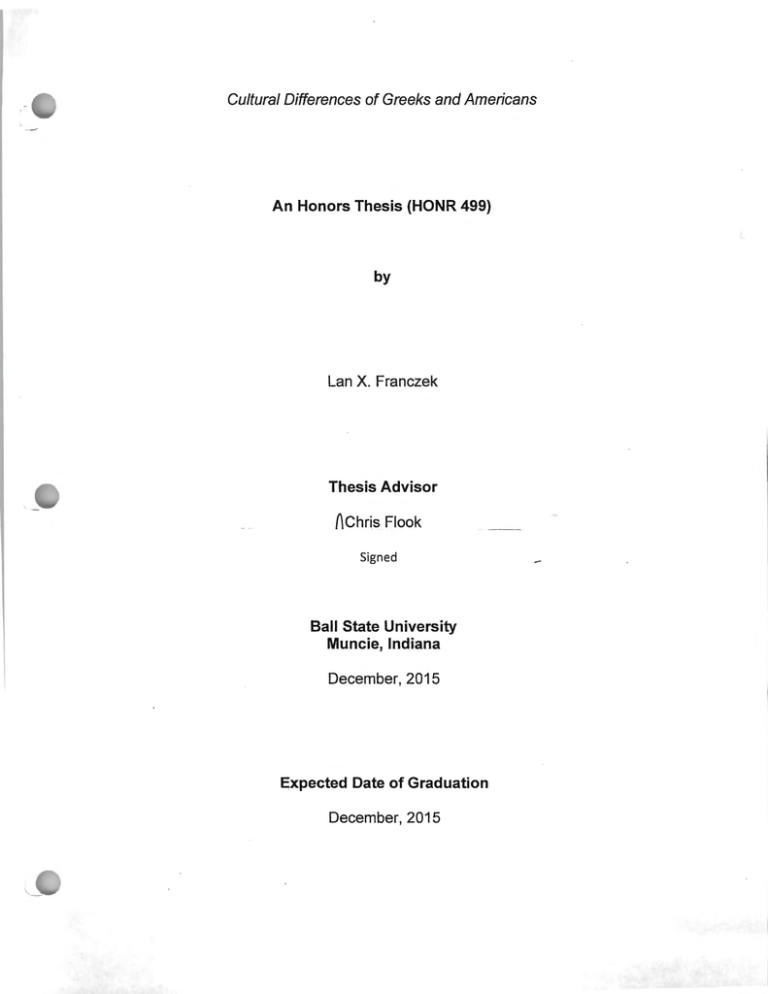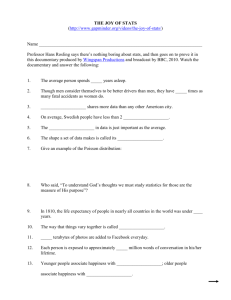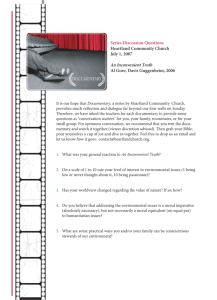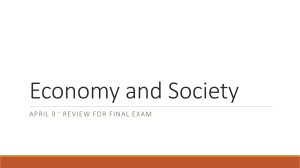Document 11002196
advertisement

Cultural Differences of Greeks and Americans An Honors Thesis (HONR 499) by Lan X. Franczek Thesis Advisor AChris Flook Signed Ball State University Muncie, Indiana December, 2015 Expected Date of Graduation December, 2015 Franczek 1 Abstract ~ . What makes up a culture? Culture" is a complex term that has many aspects to it, making it difficult to define. I go deeper into the concept of culture as I explore various aspects of Greek culture and how they differ from American culture. By filming a documentary called, Cultural Differences of Greeks and Americans, I have broken the differences into four categories: lifestyle, arts, economy, and food. Author's Statement This author's statement details one woman's journey to producing the documentary called, Cultural Differences of Greeks and Americans. It takes her on an adventure through Greece where she experiences and embraces Greek culture. It explores the lengthy process of management, finding subjects, and post-production. Acknowledgements I would like to thank all the KIIS students, KIIS professors, and the Greek residents who made it possible for me to make this documentary. Their opinions and insights were helpful in completing this project. I would also like to thank my advisor, Chris Flook, for responding to my question efficiently and making this process easier. Franczek 3 Introduction cul-ture (kuhl-cher) n. 1. "The arts and other manifestations of human intellectual achievement regarded collectively." Ever since my college career began, I have wanted to study abroad. Like many students, I also craved for the adventure outside of the United states. Studying abroad was a goal I hoped to achieve before finishing college. Studying abroad usually requires you to take credit courses to supplement the travel experience, though. As a telecommunication major with a focus in video production, I found it difficult to find a credited course abroad that would transfer as part of my major. As I hoped to achieve my goal of studying abroad , I thought of another way: studying abroad would shape my Honor's Thesis. To graduate with Honors at Ball State University, a student must complete not only the required courses, but also complete an Honor's Thesis. I did some research on countries that were appealing to me and that I could afford to study in. Greece happened to be the country that fit my needs. The courses that I was interested in were Day to Day in Ancient Greece and Greek Mythology. This got me thinking that maybe I could turn my experience of studying abroad into a thesis, and that's where my idea was born. My interest in filming, documentary, and culture made me think to combine all three to produce a documentary about Greek culture. I had to figure out how to make this into an Honor's Thesis, so I decided to focus the documentary on Greek culture and expand that by highlighting differences between Greek and American culture. Management My first step towards completing my thesis was to set up my travel abroad excursion. I completed the application and noted the process it would take to complete the program. Since this trip was not done as a part of my major, I realized I would not have anyone to help me with the production. I thought through all the equipment I would need to work on my thesis while in Greece, as well as whether or not I had permission to take that equipment with me. I ended up taking my Canon 600 OSLR camera, a Rode mic, a monopod, two memory cards, and a laptop. I knew I would obviously need my camera for filming, and I did some research to find out that a Rode mic would be best since I would be outside most of the time. In addition, I figured I might be limited on location and space, so a monopod would be better than a tripod. I also figured that I would be limited on storage with only two memory cards, so I brought my laptop to backup my footage just in case. Franczek 5 Finding Subjects There is only so much that you can plan out, but what I have learned from this industry is that you have to compromise, be flexible, or find an alternative. The first rounds of interviews were rough. At this point I had found Greek subjects, but not any who could speak English well. This communication barrier made the questions too hard for them to comprehend, and after I simplified the questions they still seemed to have a hard time understanding it. Even though many of them still didn't understand the revised questions, I humored them and let them answer anyway. But, their answers did not contribute much to my thesis in the way that I had hoped. It was two weeks into the five-week program and I was frustrated that my documentary was going nowhere. I felt like I wanted to give up and change my thesis completely or revise my idea. I emailed my advisor asking about other approaches I could use and the Associate Dean of the Honor s College received the email as well, so that he was aware of the situation. After communication with these advisors I was encouraged to continue with the cultural documentary and thus back on track. The following weeks were better. I went forth with my original idea and continued the second round of interviews. These were more of a success because my subjects were able to speak and understand English. Not only did I have Greek residents, I also had students and professors from the program give me their view of Greek culture based on what they had experienced so far. The main problems I had with all my interviews, whether they were Greek or not, was the sound quality. I was limited on the locations that I could film. I didn't want to disrupt anyone's day or routine by taking them into a secluded location, so this resulted in a lot of background noise thus making the Rode mic ineffective. The interviews that I did with KIIS interviewees were mainly inside and had adequate lighting. The Greek interviewees were all outside, which provided better lighting than the interviews done indoors. In addition, to issues with lighting and sound, I also was limited on B-roll, which would allow me to overlap video footage and an interviewee's voice. I figured I could just use photos because I've seen a lot of documentary where they are just photo, but then again there are also ones with both photos and videos. It did not occur to me until the end of the trip that I would need more video footage of landscape and other things so that my documentary would not show the interviewees the entire time. To solve this problem, I figured I would just use photos since many documentaries, such as historical ones, only have photos available to show while words are being spoken. After the trip was over, I did three final interviews with the KIIS professors that went to Greece, who happened to also be professors at Ball State. I planned Franczek 7 these interviews out better and found a new alternative to sound. After some research on reasonable, affordable lav mics I was able to get better sound. In addition, I was in a controlled environment that allowed me to reduce background noise and have decent lighting. Post-Production Due to my disregard of negligence regarding B-roll, I had to salvage any workable footages I could use as B-roll and shuffle through hundreds of photos that were related to my documentary. But before I did that I needed to rearrange my footage and sort out the ones that I would like to use. I opened up Adobe Premiere Pro and with each interviewee I started a new sequence. From there I cut and edited each interviewee and then renamed each clip in each sequence. I than exported the audio files from these sequences into Adobe Audition and edited the audio. The interviews that I did with the lav mic had good sound quality and didn't require that much adjustment. Unfortunately, the interviewees that were on the Rode mic had excessive background noise. After many attempts to salvage the clips, I found that it could not be done and, upon my best judgment, discarded them so as not to ruin the integrity of the documentary. After sorting and a little editing, it was time to figure out what kind of format or style I want this documentary to have. This includes the title pages, lower thirds and arrangement of video clips. I decided that I wanted an opinion from a professor or a Greek resident, which would be backed up with a students' view, and vice versa . After more selective editing and formatting, I made a final sequence, which would be comprised of clips from all my sequences of interviews and photos from my trip . I also used photos from Google to compensate for my lack of 8-roll footage and personal photos, though my personal photos outweigh the handful I used from Google. When I searched for photos on Google, I was able to find photos that were "labeled for reuse" to make sure that I had permission to use them. The final step of this whole thing was to export the video. Conclusion After completing my documentary I felt proud and relieved. The amount of time, effort, and steps that went into production and post-production was tedious, but worth the result. I hope in the future people will see this documentary and appreciate the adventures of what learning about a new culture can be like. I also hope that people will recognize that new adventures and unknown cultures are worth exploring . As a Telecommunication major, I have learned more techniques of editing in Adobe Premiere Pro, taught myself the basics of Adobe Audition, and the process of what a documentary entails. After making this, even though it was a great experience, I realize that I may stick with watching documentaries instead Franczek 9 of pursuing a career in documentary filmmaking. I think perhaps I want to go into the music industry and produce music videos instead. The stories of the songs already exist, it just needs a vision or interpretation of it into a music video. Overall, I don't regret making this documentary. I have grown from the experience professionally and personally . -Lan X. Franczek


